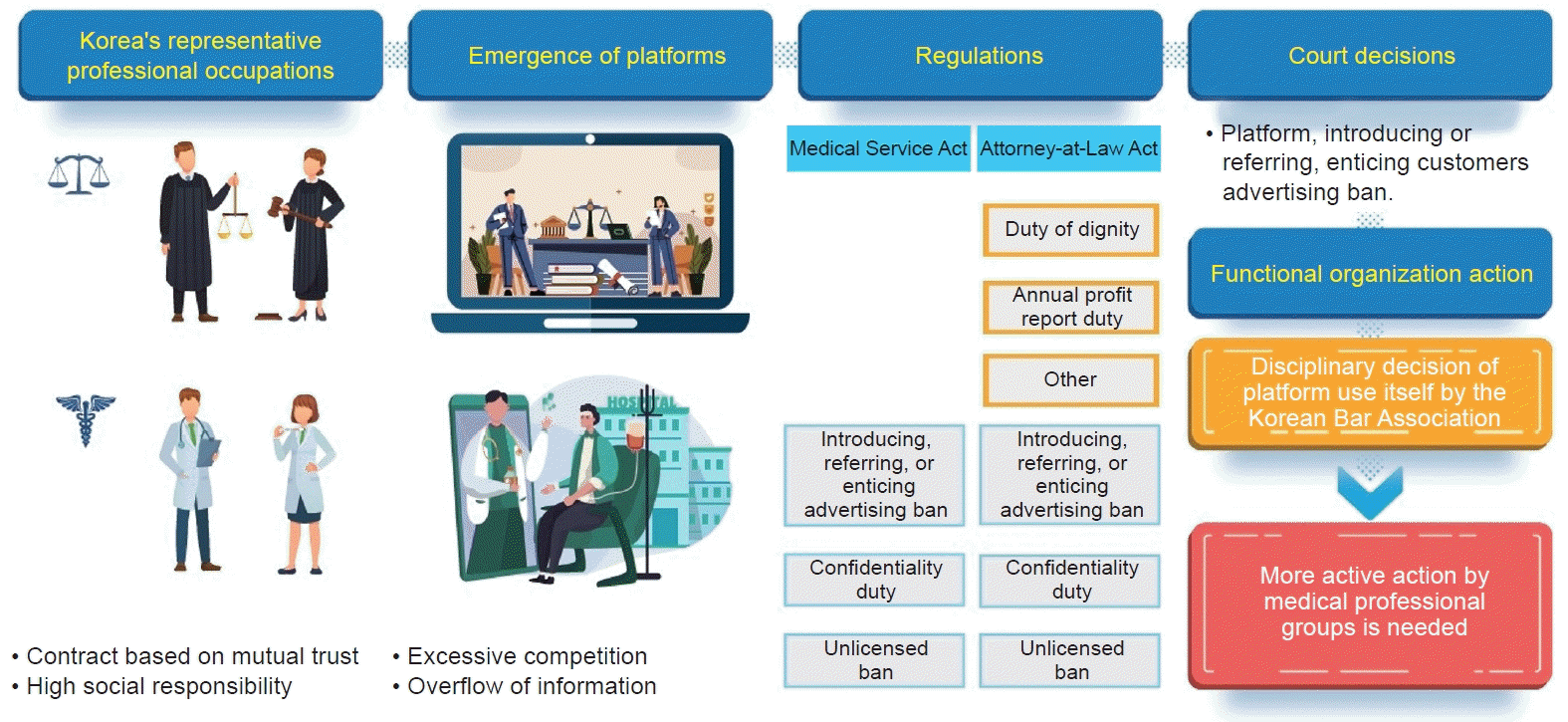1. Gruebner O, van Haasteren A, Hug A, Elayan S, Sykora M, Albanese E, et al. Digital platform uses for help and support seeking of parents with children affected by disabilities: scoping review. J Med Internet Res. 2022; 24:e37972.

2. Kim HS, Yoon KH. Lessons from use of continuous glucose monitoring systems in digital healthcare. Endocrinol Metab (Seoul). 2020; 35:541–8.

3. Kim HS. Towards telemedicine adoption in Korea: 10 practical recommendations for physicians. J Korean Med Sci. 2021; 36:e103.

4. Kim HS, Cho JH, Yoon KH. New directions in chronic disease management. Endocrinol Metab (Seoul). 2015; 30:159–66.

5. Litchfield I, Shukla D, Greenfield S. Impact of COVID-19 on the digital divide: a rapid review. BMJ Open. 2021; 11:e053440.

6. Kim HS, Kwon IH, Cha WC. Future and development direction of digital healthcare. Healthc Inform Res. 2021; 27:95–101.

7. Choung HU. A study on the legitimacy of legal tech. Chung-Ang Law Rev. 2022; 24:7–36.
12. Sharma A, Harrington RA, McClellan MB, Turakhia MP, Eapen ZJ, Steinhubl S, et al. Using digital health technology to better generate evidence and deliver evidence-based care. J Am Coll Cardiol. 2018; 71:2680–90.
13. Howarth A, Quesada J, Silva J, Judycki S, Mills PR. The impact of digital health interventions on health-related outcomes in the workplace: a systematic review. Digit Health. 2018; 4:2055207618770861.

14. Park JI, Lee HY, Kim H, Lee J, Shinn J, Kim HS. Lack of acceptance of digital healthcare in the medical market: addressing old problems raised by various clinical professionals and developing possible solutions. J Korean Med Sci. 2021; 36:e253.

18. Kim YM. A study on the administrative law on the improvement of medical advertising regulations. J Leg Stud. 2020; 28:21–54.

19. Pines WL. Direct-to-consumer advertising. Ann Pharmacother. 2000; 34:1341–4.

20. Shiragami M. Problems with advertisements for health foods. Yakugaku Zasshi. 2018; 138:1523–30.

21. Zaborovskyy V, Buletsa S, Bysaga Y, Manzyuk V, Lenher Y. Professional activity of medical lawyer. Georgian Med News. 2020; (300):146–52.
22. Roemer MI. The need for professional doctors of public health. Public Health Rep. 1986; 101:21–9.
23. Kim HS. Apprehensions about excessive belief in digital therapeutics: points of concern excluding merits. J Korean Med Sci. 2020; 35:e373.

24. R Niakan Kalhori S, Bahaadinbeigy K, Deldar K, Gholamzadeh M, Hajesmaeel-Gohari S, Ayyoubzadeh SM. Digital health solutions to control the COVID-19 pandemic in countries with high disease prevalence: literature review. J Med Internet Res. 2021; 23:e19473.

25. Kim HS. Lessons from temporary telemedicine initiated owing to outbreak of COVID-19. Healthc Inform Res. 2020; 26:159–61.

27. Shin HY. [Non-face-to-face platform that encouraged “drug shopping” billed KRW 300 million for acne medication alone according to Shin Hyun-Young, a member of the National Assembly of Korea] [Internet]. Naver Blog;2022. [cited 2023 May 23]. Available from:
https://blog.naver.com/shydeborah/222893113315.
28. Velavan TP, Meyer CG. The COVID-19 epidemic. Trop Med Int Health. 2020; 25:278–80.





 PDF
PDF Citation
Citation Print
Print




 XML Download
XML Download